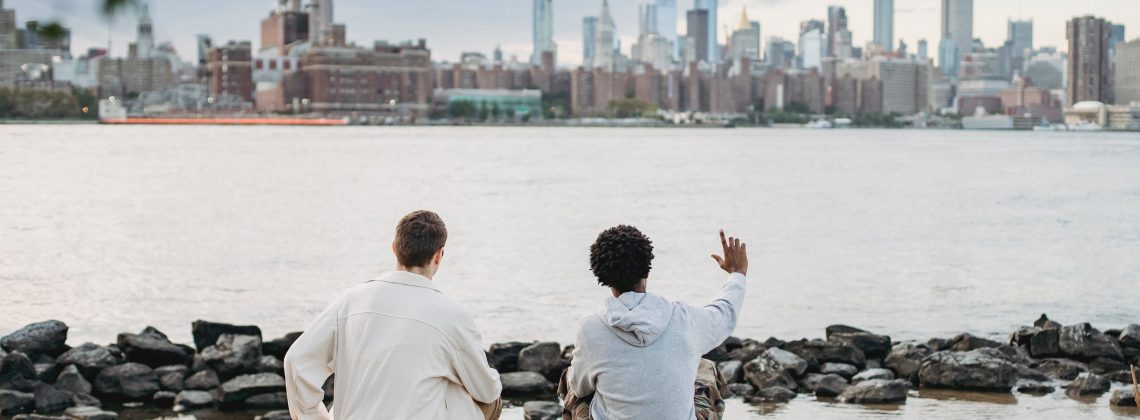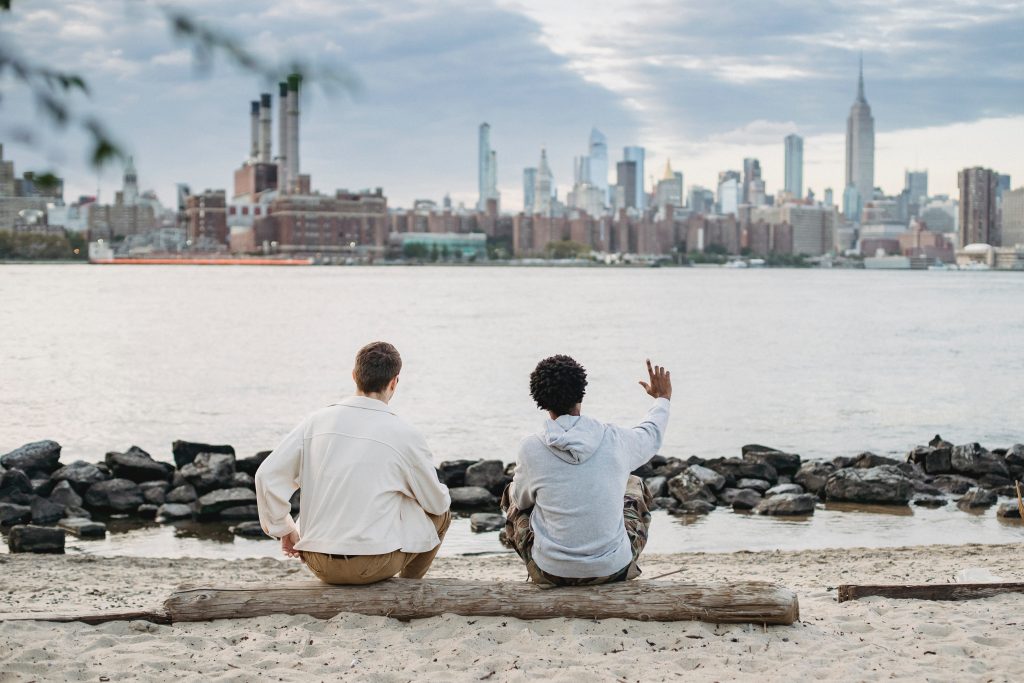

What happens when Evangelicals and Nones gather at the Post-Post-Modern River?
For the last few years I have lived and worked in a tribe of Gen Z graduate students in a remote village on the muddy banks of Post-Post-Modern River. I was raised by evangelicals to believe that every calling is ultimately a missionary calling, and so I can’t help seeing myself as a Christian standard-bearer out here in the Woke Hinterlands. To be honest, I’m not a typical evangelical; I’m a small-o orthodox Christian who loves Jesus but doubts almost everything else. Deep conversations with evangelical friends sometimes end with them telling me that they “love me anyway.” But none of that matters when I’m here alone among the Nones.
Before I started graduate school in a social science field, I didn’t realize how out of place I would feel. Some of it is the age difference. Other “non-traditional” (middle-aged) students in the department are former lawyers or teachers who know how to make menopause look both intimidating and fragile. They channel Jamie Lee Curtis channeling Virginia Woolf. But I’ve never telegraphed inaccessibility, and I doubt I could pull it off now, even with some late-in-life tattoos and a pierced nose. I would just look like a woman who builds carpeted jungle-gyms in her backyard for neighborhood squirrels.
My struggle is more than generational or stylistic, anyway. It’s uncomfortable in the early 2020’s to identify as an evangelical—even a half-derriere evangelical—in the social sciences, where it’s assumed that we study human life in order to bring healthy reform and improve on the past. The Christian past. Some pioneers of the progressive movement in America were sincere Christians who took the moral teachings of Jesus seriously as they fought for causes like prison reform and child welfare. And even today, mission-minded evangelicals and progressives travel together on roads partly carved out from Christ’s teachings on human justice, care for the poor and vulnerable, and the high calling of service over self-interest. But inevitably our roads get—well, all forked-up. The people who travel with you eventually see you as standing in their way.
I don’t need to tell anyone that politics and social media have fueled polarization in the last four years, or that the most contentious areas are reproductive freedom and sexual and gender identity. One day, in a class on human sexuality, we were asked to raise our hands if we considered ourselves pro-life. I did raise my hand, along with three others, though my convictions were the wishiest of washy. (Why a whole hand? Wouldn’t four fingers be more nuanced?) After taking this mild stand, I experienced a mild stomachache. Across the room, a young white evangelical woman said something excruciatingly rigid. A young white progressive woman became upset, triggered by memories of a bad experience in a Catholic school. We learned later that the evangelical student had found herself in hot water with the department; if she didn’t change how she related to others, she might not be placed for an internship.
I’ve heard the word “persecution” thrown around by evangelical friends lately. Some conservative thinkers and writers believe that the progressive left, once having consolidated power in academia, media, tech, and government, will attempt to fulfill its utopian vision of society with totalitarian tools. Detention camps, moral credit systems, the whole gulag. Such conversations take me back to scare-sermons in my childhood, when we were led to believe that persecution by Soviet atheists was imminent. If someone with a kalishnikov asked you to renounce Jesus, what would you do? The point of such talk, when it wasn’t purely manipulative, was to get us to think about where we placed our faith—in temporal prosperity, in safety and comfort, or in Jesus Christ, who told us that we might be asked one day to suffer for Him?
My experience in the woke classroom was not persecution in the 16th century hanging and disembowelment sense—my intestines were only slightly agitated. But the disgust of the professor and the young progressive students was palpable, and I felt the anxiety that human beings often feel when other humans draw away and show contempt. It’s the anxiety of shame, which stems from a primitive fear of abandonment and extinction—the terror of being sent outside the house, outside the village, to manage on our own against the dark and the wolves. In the face of an extinction threat, the anxious brain formulates strategies to survive. Should I crawl back and beg for readmittance? Betray my friends? Believe (or tell) lies that give false comfort? Find allies out here in the wilderness? Make weapons and build walls? Capitalize on the fear of others to gain power and thus more safety for myself? There are so many tempting options when suffering is off the table.
Real persecution of Christians may happen in the American future. God knows Black Americans, including Black Christians, endured it for hundreds of years—still endure versions of it—at the hands of people claiming to be God-lovers. I can’t think of any abandonment worse than that, and I’m guessing it explains why Black Christians don’t get as worked up as whites about the loss of Christian influence in society. But at the moment, a lot of Christian suffering is rooted in our own emotional perceptions. In a context of political and cultural polarization, we sense others drawing away, and this triggers human worries about isolation. The feeling of abandonment is especially frightening when we feel our own neighborhoods, churches, and families pulling apart. Nor is the fear of isolation only on the right. As the country polarizes, we all feel a sense of separation anxiety. My mom has gone full Q! My kids won’t speak to me!
The question for a Christian is always the same, even if the Soviets never show up or woke boogeypersons never get their act together and exclude us from public life. If Jesus is the “You” who is always there and never leaves, doesn’t that calm our fears of being shut out? Our anxiety of extinction? If we are called to suffer not only for but with Jesus, how can we ever really be alone?
For others dealing with fears of polarization—on the Right or Left—one way to calm fear is to draw closer to those you disagree with rather than move further away. Not by trying to mimic their beliefs in order to save your own skin but by engaging them wherever possible and serving them as the person you really are. That same woke professor I mentioned above became my internship supervisor for three months and showed me real grace and generosity. Away from the social anxieties provoked by classroom battles, she offered a peaceful space to talk about worries regarding the balance of family and work. At the end of the quarter, I thanked her and told her she had been an answer to prayer, which she was.
It was a very simple thing—answering her simple act of human kindness with one of my own. But after I did it, I felt surprisingly strengthened in heart. The very opposite of alone.
M. Elizabeth Carter is a counselor and writer living in Alabama.
M. Elizabeth Carter is a counselor and writer living in Alabama.